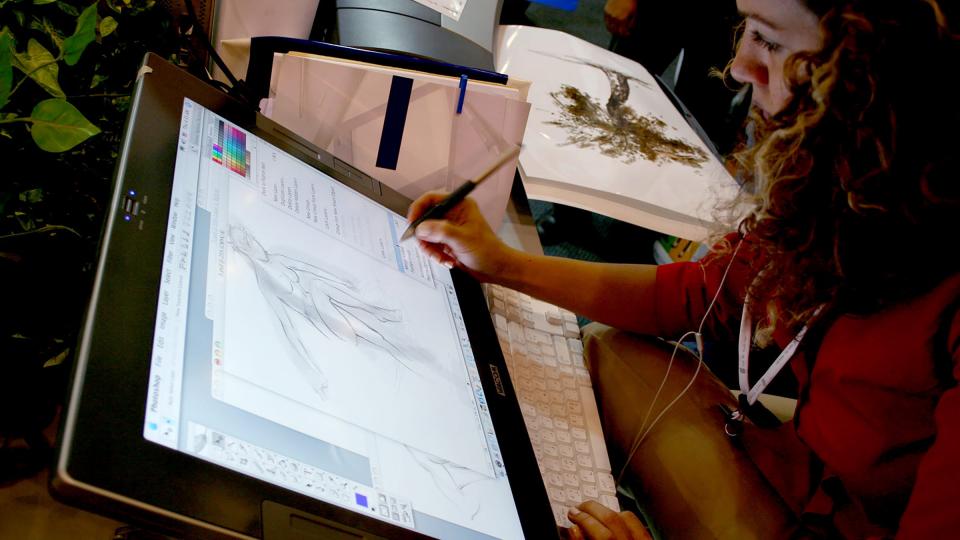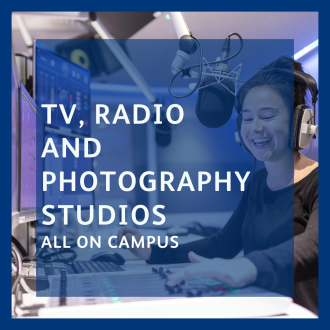- Postgraduate
Graphic Communication Design MA
Overview
MA Graphic Communication Design is an enterprising and research-oriented creative practice course for both graphic designers wishing to expand their current practice and those who would like to enter the discipline from other creative fields.
This graphic design masters course will equip you with a combination of studio practice, technological advancement, design theory, research, and entrepreneurial skills relevant to graphic design contexts.
Through a set of practice modules focused on typographic communication, collaborative practice for social change and design strategy, you'll explore visual and multisensory forms of communication to convey social, political and societal messages in imaginative and professional ways.
With open-ended assignments and some optional modules, you can tailor the course to your needs and build a portfolio that reflects your personal development prospects.
Course content will further prepare you to plan towards a range of design leadership or senior roles in the creative industries.

Select your desired study option, then pick a start date to see relevant course information:
Start date:
If your desired start date is not available, try selecting a different study option.
Why study Graphic Communication Design with us?



What our students say…
The best part of the course is that you can explore topics of your interest and go in-depth with projects that advance your skill set. Finishing the course not only gave me more practical tools, but it also taught me to ask questions that, hopefully, will help me change the world for the better.
I am still as enthusiastic today as I first was when I joined the MA programme. Unlike many universities, UWL warmly welcomes newcomers, providing endless engaging events, trips, support, not to mention the mind-blowing workshops! It amazes me that professional instructors, with high credentials are the ultimate example of the word modest!




Course detail & modules
MA Graphic Communication Design has been developed in consultation with industry and academic experts from both national and international design backgrounds. The course offers in-depth knowledge and a systematic understanding of practical, technical and conceptual industry-relevant skills needed to work towards advanced careers within the field of graphic design. The course content brings design strategy and collaborative practice for social change into the core of the graphic design discipline through specialist modules and practice-based research projects.
The graphic design masters course is taught over three semesters through five compulsory modules and one optional module (180 credits in total). In semester one, you will have the opportunity to select one of two optional modules: Branding or Typographic Communication. These will be advised through a tutorial and are subject to availability depending on student numbers.
On this course, you will be encouraged to develop your creative voice, recognise your strengths and identify intellectual objectives. By developing independent design thinking and exploring creative investigation methods you will be able to examine the graphic designer’s role in reaching diverse audiences in the rapidly changing global markets. Incorporation of diverse teaching methods from problem-based workshops to live projects with industry partners will guide you to engage in current critical debates and creative reflection to approach complex design challenges.
As an active postgraduate member of the department, you will be linked to industry and a rich research community, talking directly to key figures, taking part in live projects, attending designer-makers studios and going on industry-relevant field trips. Through enterprising course activities, you will also gain the confidence and courage to take steps towards entrepreneurial venture-making in the creative industries.
MA Graphic Communication Design can be studied in full-time and part-time modes to meet professional and personal needs. The course is supported by a highly-skilled staff team with strong academic backgrounds and extensive industry connections.
As a postgraduate student at the London School of Film Media and Design, you will have access to creative learning environments such as a printmaking room, photography studio, film and video-making facilities, and computer labs.
You will study all the compulsory modules plus one optional module.
Please note: optional modules will be advised via tutorial and are dependent on student numbers.
Compulsory modules
-
Research for the Creative Industries
This module contains a series of seminars and practical workshops that will engage you with critically analytical tools to interrogate key conceptual frameworks and explore cultural, historical, ethical and methodological perspectives for the fields of advertising, branding and communication. -
Contexts of Graphic Communication
This is a practice-based module to support and facilitate you to critically reflect on your creative self and locate your practice within the wider social, historical, technical and professional contexts of Graphic Design.
You will be able to use traditional methods and apply emerging technologies to explore visual and multi-sensory message making in relation to systems, spaces and audiences around you through experimental and reflective design methods.
-
Collaborative Design Practice for Social Change
This module is designed to emphasise and put into practice the collaborative and interdisciplinary nature of the graphic design field. The module will equip you with skills and knowledge to generate collaborative creative ideas and share tasks professionally and confidently to arrive at a design solution that leads to a positive social change.
-
Design Strategy
In this module you will develop professional skills to take strategic actions to identify organisational issues, make design decisions, lead creative concepts and generate more meaningful user experiences. Through active learning, research and critical analysis, you will be able to identify external factors in project development and evaluate design strategies that have led to existing innovative solutions. The value of design strategy as part of the design process will be explored and design thinking methods will be utilised in arriving at creative decisions.
-
Masters Project or Dissertation
The Masters project or Dissertation module will provide you with the opportunity to develop a personally relevant topic that demonstrates the research ideas and concepts you have developed throughout the MA course.
You will come up with a resolution to your proposal and answer key research questions by demonstrating evidence of advanced conceptual and theoretical capability over an extended period of self-directed study. You will be introduced to combined and alternative approaches in your field of interest.
Optional modules
-
Branding
On this module, you will examine how information is collected, deployed, managed and made meaningful to brands. Additionally, you will study the development and current theories of information and communication underpinning branding strategies.
-
Typographic Communication
This module is for students who want to have strong typographic outputs in their graphic design portfolio. It is designed to develop your advanced conceptual, technical and practical skills for designing creative solutions through typography as a communication medium.
You will undertake a typographic enquiry by analysing the relationships between word, text and textuality and their visual expression by drawing links from other disciplines and social, political and cultural contexts. You will also experiment with digital and physical type, with projects leading to two and three-dimensional outcomes such as text on paper, text on screen, sculptural and spatial type.
Entry requirements
You should have an honours degree (2:2 or above) from a UK university or equivalent. We may also offer you a place based on relevant experience or training, normally from within the work environment. All applications are considered individually.
Applicants with a degree in a non-creative subject may be considered on the basis of their portfolio if they can demonstrate critical knowledge of the subject area and the potential to develop their practical and critical abilities through academic study.
To apply for this course you will also need to provide a portfolio and CV plus personal statement:
Portfolio
We require you to submit a portfolio as part of your application. As applicants come from diverse fields, we don’t define an ideal portfolio. However, your work should show an aptitude for design. If you don’t have professional experience, or are coming to this course from undergraduate studies directly, you can show student projects or personal creative outputs. In all cases, please include short captions and design rationale behind your ideas and some evidence of the working process to show research and creative development. We accept a wide range of formats and methods for the submission of the portfolio. Please feel free to get in touch with the course team if you have any doubts or questions.
CV and Personal Statement
Your application form must be supported by the following two documents:
- Curriculum Vitae (CV): A full CV to include your full education and any employment history. This is also applicable to students coming straight from an undergraduate degree. It is not a requirement to have work experience to apply for this course.
- Personal Statement: Please communicate your motivation for being on this course in no more than 500 words. Consider stating your research interests or career prospects.
Please note, all applicants who fulfil the above criteria will be invited for an online or in-person interview.
You need to meet our English language requirement of 6.5 overall score for IELTS, with a minimum of 5.5 for each of the 4 individual components (Reading, Writing, Speaking and Listening). Visit our English language requirements page for information on other English language tests we accept.
You also need academic qualifications at the same level as UK applicants. In some countries where teaching is in English, we may accept local qualifications. Check for local equivalents.
We offer pre-sessional English language courses if you do not meet these requirements. Find out more about our English Language courses.
To apply for this course you will also need to provide a portfolio and CV plus personal statement:
Portfolio
We require you to submit a portfolio as part of your application. As applicants come from diverse fields, we don’t define an ideal portfolio. However, your work should show an aptitude for design. If you don’t have professional experience, or are coming to this course from undergraduate studies directly, you can show student projects or personal creative outputs. In all cases, please include short captions and design rationale behind your ideas and some evidence of the working process to show research and creative development. We accept a wide range of formats and methods for the submission of the portfolio. Please feel free to get in touch with the course team if you have any doubts or questions.
CV and Personal Statement
Your application form must be supported by the following two documents:
- Curriculum Vitae (CV): A full CV to include your full education and any employment history. This is also applicable to students coming straight from an undergraduate degree. It is not a requirement to have work experience to apply for this course.
- Personal Statement: Please communicate your motivation for being on this course in no more than 500 words. Consider stating your research interests or career prospects.
Please note, all applicants who fulfil the above criteria will be invited for an online or in-person interview.
Fees & funding
Additional costs
There are additional costs for this course that are not included in the tuition fees. See the links below to get a better idea of what to expect:
If your course runs for two years or more, you will need to pay the fee for each academic year at the start of that year. If your course runs for less than two years, the cost above is for your full course and you will need to pay the full fee upfront. Government regulation does affect your fees, so what you pay may go up in future. For example, government regulation around future inflation may increase your course fees.
If no fee is shown above then the fees for this course are not available yet. Please check again later for updates.
Funding your studies
If you are studying a Masters course you may be eligible to apply for a Postgraduate Loan, this may help contribute towards your course fees and living costs.
Additional funding is available to some types of students, such as disabled students or those with dependants.
We offer a range of scholarships and bursaries, including awards for specific subjects.
Awards for students of film, media and design are also on offer.
View full details, including conditions and eligibility.
Additional costs
There are additional costs for this course that are not included in the tuition fees. See the links below to get a better idea of what to expect:
If your course runs for two years or more, you will need to pay the fee for each academic year at the start of that year. If your course runs for less than two years, the cost above is for your full course and you will need to pay the full fee upfront. Government regulation does affect your fees, so what you pay may go up in future. For example, government regulation around future inflation may increase your course fees.
If no fee is shown above then the fees for this course are not available yet. Please check again later for updates.
International students - funding your studies
We offer scholarships for international students including International Ambassador Scholarships.
Further information about funding and financial support for international students is available from the UK Council for International Student Affairs.
Teaching staff

Dr Isil Onol
Isil has been teaching various subjects related to design and cultural studies for over 12 years, mostly in module leader capacity. With specialisms in experiential design, experience design, visual research methods, curating and access, her current modules are delivered across years within the Graphic Design course.
Isil has been teaching various subjects related to design and cultural studies for over 12 years, mostly in module leader capacity. With specialisms in experiential design, experience design, visual research methods, curating and access, her current modules are delivered across years within the Graphic Design course.
Study & career progression

Upon successful completion, graduates may be qualified for a range of careers and diverse opportunities.
Potential jobs for graphic design graduates include (but are not limited to):
- Graphic Designer
- Art Director
- Creative Director
- Design Strategist
- UI/UX Designer
- Experiential Designer
- Experience Designer
- Production Designer for TV, film or theatre
- Freelance Designer
- Typographer
- Exhibition Graphics Designer
- Researcher
- Teaching in higher education
- Creative Entrepreneur.
You may also progress to study towards a PhD at the London School of Film, Media and Design.
How to apply

You can apply online at any time by following the link below.
Our application form will ask you for some information about what you want to study, your previous qualifications or experience, and how we can contact you.
Want to ask us a question first? We would love to hear from you. Contact us free on:
- 0800 036 8888
- courses@uwl.ac.uk
We may ask you to submit a portfolio of work and come to the university to discuss it with us. Find out more about submitting portfolios.
Apply for this course
Next steps after making your application
We aim to make a decision on your application as quickly as we can. If we need any more information about your qualifications, we will be in touch.
In the meantime, come and visit us and find out more about what studying at UWL is like. Sign up for an open day or join a campus tour.
Visit us and see for yourself
Talk to our tutors and find out about our courses and facilities at our next open day or join a campus tour.
We're here to help
Any questions about a course or studying at UWL? We're here to help - call us on 0800 036 8888 (option 2, Monday – Friday 10am-4pm) or email us on courses@uwl.ac.uk.
Our postgraduate prospectus
All of our courses in one place - download now or order a hard copy.

You can apply online at any time by following the link below.
Our application form will ask you for some information about what you want to study, your previous qualifications or experience, and how we can contact you.
Want to ask us a question first? We would love to hear from you. Contact us free on:
- 0800 036 8888
- courses@uwl.ac.uk
We may ask you to submit a portfolio of work and come to the university to discuss it with us. Find out more about submitting portfolios.
Apply for this course
Next steps after making your application
We aim to make a decision on your application as quickly as we can. If we need any more information about your qualifications, we will be in touch.
In the meantime, come and visit us and find out more about what studying at UWL is like. Sign up for an open day or join a campus tour.
Visit us and see for yourself
Talk to our tutors and find out about our courses and facilities at our next open day or join a campus tour.
We're here to help
Any questions about a course or studying at UWL? We're here to help - call us on 0800 036 8888 (option 2, Monday – Friday 10am-4pm) or email us on courses@uwl.ac.uk.
Our postgraduate prospectus
All of our courses in one place - download now or order a hard copy.

You can apply online at any time by following the link below.
Our application form will ask you for some information about your qualifications, your visa (if required) and how we can contact you.
Want to ask us a question first? Our dedicated international students’ team would love to hear from you.
- email international@uwl.ac.uk
We may ask you to submit a portfolio of work and come to the university to discuss it with us - or do so online, if you aren't able to travel here. Find out more about submitting portfolios.
Apply for this course
Next steps after making your application
We aim to make a decision on your application as quickly as we can. If we need any more information about your qualifications, we will be in touch.
In the meantime, come and visit us and find out more about what studying at UWL is like. Sign up for an open day or join a campus tour.
Visit us and see for yourself
Talk to our tutors and find out about our courses and facilities at our next open day or join a campus tour.
We're here to help
Any questions about a course or studying at UWL? We're here to help - call us on 0800 036 8888 (option 2, Monday – Friday 10am-4pm) or email us on courses@uwl.ac.uk.
Our postgraduate prospectus
All of our courses in one place - download now or order a hard copy.

You can apply online at any time by following the link below.
Our application form will ask you for some information about your qualifications, your visa (if required) and how we can contact you.
Want to ask us a question first? Our dedicated international students’ team would love to hear from you.
- email international@uwl.ac.uk
We may ask you to submit a portfolio of work and come to the university to discuss it with us - or do so online, if you aren't able to travel here. Find out more about submitting portfolios.
Apply for this course
Next steps after making your application
We aim to make a decision on your application as quickly as we can. If we need any more information about your qualifications, we will be in touch.
In the meantime, come and visit us and find out more about what studying at UWL is like. Sign up for an open day or join a campus tour.
Visit us and see for yourself
Talk to our tutors and find out about our courses and facilities at our next open day or join a campus tour.
We're here to help
Any questions about a course or studying at UWL? We're here to help - call us on 0800 036 8888 (option 2, Monday – Friday 10am-4pm) or email us on courses@uwl.ac.uk.
Our postgraduate prospectus
All of our courses in one place - download now or order a hard copy.
Search for courses
Student life at UWL
Important notes for applicants
Disclaimer
*Modern universities - defined as higher education institutions that were granted university status in, and subsequent to, 1992.
**The National Student Survey 2023 and 2024 - Average of answers to all questions by registered student population. Excludes specialist institutions.
Testimonials - our students or former students provided all of our testimonials - often a student from the course but sometimes another student. For example, the testimonial often comes from another UWL student when the course is new.
Optional modules - where optional modules are offered they will run subject to staff availability and viable student numbers opting to take the module.
Videos - all videos on our course pages were accurate at the time of filming. In some cases a new Course Leader has joined the University since the video was filmed.
Availability of placements - if you choose a course with placement/internship route we would like to advise you that if a placement/internship opportunity does not arise when you are expected to undertake the placement then the University will automatically transfer you to the non-internship route, this is to ensure you are still successful in being awarded a degree.





